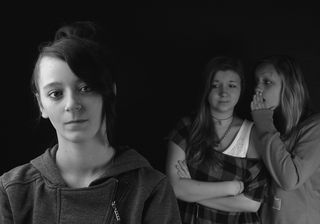Adolescence
An Extra Shot of Logic to the Teen Incident at Starbucks
A venti size answer to the brouhaha
Posted June 5, 2016
There’s a whole lot circulating this week about Michelle Icard, the woman who called out three teenage girls at a Starbucks for their behavior, via a note she penned and delivered to their table. The response on both sides of this is tremendous. There are those praising her for intervening, and there are those suggesting that she is just a grown-up mean girl who should mind her own business.

As someone who researches and teaches about gender socialization, gender roles, issues of conformity and deviance, and the sociology of girls and women, both what happened as well as the controversy surrounding it have piqued my curiosity. I find myself most interested in what the parents and peers of the girls have said. Also, in reading about Icard, she has children of her own and I wonder what their response is; are they cringing, thinking, “Oh mom, nooooo” or do they by any chance know these girls and feel validated? Do these parents know these were their daughters who came across like this in public to another adult? Has this happened routinely, and was it just the one time they got caught and confronted in the act? Do their classmates experience these girls this way also? What would be the response of the kids whom the girls were picking on? And, what would be their reactions to Icard’s perceptions and to the worldwide comments on this? I find myself questioning the fine lines we as a society draw between “It takes a village to raise a child” and “But, you have no right to comment on my child.”
I keep wondering if and how these girls have been impacted by Icard’s message. Do they care, have they just dismissed her as a b****, do they assume she is just a cranky older lady who is out of touch, are they feeling slightly embarrassed or guilty, would this ever lead them to change their current ways, assuming this moment at Starbucks is a good indication of their general m.o.? Most of all, I find myself wondering if this message will inform any or all of the girls’ future interactions and how it might affect their attitudes and behaviors---sort of like any number of experiences we may have had as younger people that have had a certain amount of staying power as we have aged.
So, I find myself considering what Icard did right and what she might have done differently that could have been even more impactful.
I can relate to Icard in some ways---I have been that forty something woman at Starbucks uncomfortable and even outraged by tween and teen behavior. I recall an evening a few months ago at a Starbucks in Mount Pleasant, South Carolina where I was sipping a latte and trying to get work done. I saw three tween girls march up to the counter clad in Lilly Pulitzer dresses and Kate Spade wristlets and ordering frappuccinos; accompanying them was the mother of one of the girls, looking eerily like them, just about twenty five years older. After they paid and got their drinks, I watched as the mother signaled to them that she would be sitting across the café. After about fifteen minutes, the girls were progressively louder and taking up more and more physical and psychic space in the store; high pitched screaming emanated from the bathroom where all three had gone together, and then they came out running around and laughing. All this time, the mother was watching videos on speaker on her phone.
And, what did I do? I sat there, occasionally staring and glaring at the mom, wondering if and when she would stop, look up, and engage with the girls who had disrupted the whole café. Finally, I just gave up and left because the atmosphere for doing work in a relaxed way was completely contaminated by their entitlement. In my work as a college professor, I often find myself having to call students on their attitudes and behaviors. I wonder what made me less inclined and more uncomfortable to do it in that moment. Maybe it was the presence of another mother who wasn’t doing anything and my concern that if I said something directly to the girls, it would create tension with the mother. But, the situation has grated on me for how we may be giving way too much power to young people in moments like these.
So, when I first read the news about Icard, I thought, “Yessss, great idea, why didn’t I think of that?” But, in reflecting on this more now, I think maybe there were other ways to handle this. These girls are steeped in a world of anonymity fueled by social media; Icard signed the note “M” and dropped it off at their table and immediately left and then posted all of this to her own Facebook page which has garnered a lot, and I mean a lot, of attention. I think Icard’s words would have been more powerful and had more credibility and the real ethic of care that she intended had she shown the courage to sign her name; she is a highly regarded author and acclaimed speaker. Since she is public about her own experience of having endured teasing and taunting, perhaps this was a moment where the still small girl inside of her was unable to speak out and yet she wanted, in any way she could muster, to challenge them on their hurtful words, to walk back in time to the girls who had caused her pain. I get that.
I think Icard intended to cultivate empathy, compassion and reflection in these young people but I worry that the way she went about it didn’t show these girls that she was fully living all that out.
If I could tell those girls anything, it would be to imagine their future selves in five, ten or fifteen years and to ask themselves, “How do you want to be remembered?”


